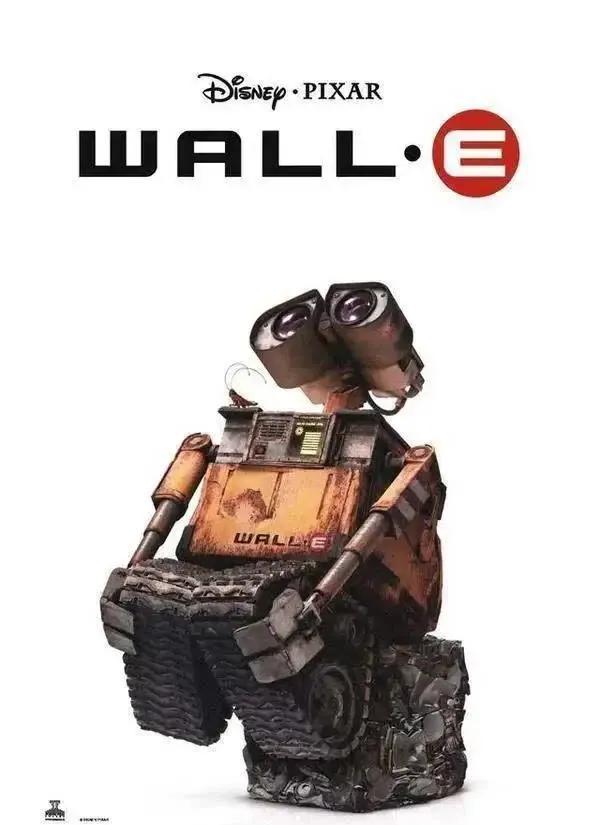Digging and digging, WALL · E soon saw an old white refrigerator. He activated a welding beam between his large binocular-like eyes and cut the door down the middle. With a clang, the two pieces of the door fell off the refrigerator. WALL · E looked inside and saw a small green object in a corner. It was sprouting from a pile of dark brown soil. WALL · E gazed at it in wonder. Now, this was something really unusual. He didn’t know why, but he liked it. The object had a stem with flat green ovals hanging from it. Gently, he picked it up. Making sure that it was safely cushioned in its soil, he placed it inside the old boot he’d found earlier. He tucked the object inside his box to examine later. WALL · E sensed that the green thing was special. What he didn’t know was that it was a plant.

挖呀,挖呀,不久之後瓦力看見一台白色的舊冰箱。他那像雙筒望遠鏡的大眼睛間發射出一道焊接雷射,将冰箱門從中間截斷變成兩片。“當啷”一聲,這兩片門從冰箱上脫落下來。瓦力向冰箱内看去,隻見在角落裡有一個小小的綠色物品。它正從一堆深褐色的泥土中抽出芽來。瓦力好奇地盯着它。嗯,這東西真不同尋常。他不知道為什麼,但就是喜歡它。這個物品的莖上懸着幾個綠色的橢圓薄片。他輕輕将它拿起,確定它被完好地包裹在泥土中,然後将它放在了他之前發現的舊靴子裡。他将這個物品收在他的百寶箱裡準備以後再檢視。 瓦力意識到這個綠色物品很特别。他所不知道的是它是一株植物。
refrigerator 英[rɪˈfrɪdʒəreɪtə(r)] 美[rɪˈfrɪdʒəreɪtər] white goods in which food can be stored at low temperatures n. (電)冰箱; 來自 refrigerate,冷卻,冷藏。常縮寫自 fridge. This dessert can be served straight from the refrigerator. 這甜點從冰箱裡拿出後即可食用。
短語 ammonia refrigerator 氨冷凍機 cryogenic refrigerator 低溫緻冷器 refrigerator deodorizer 低溫脫臭機 refrigerator cleaner 冰箱清洗劑 refrigerator paper 冰箱用紙 refrigerator unit 緻冷裝置 freon refrigerator 氟利昂制冷機 household refrigerator 家庭冰箱 thermostat for refrigerator 冰箱用溫度控制器 turbo refrigerator 透平緻冷機
【同義詞】 icebox n. 冰箱;冷藏庫 Making an efficient icebox was not as easy as we might now suppose. 制造一台有效率的“冰箱”不像我們想像的那麼簡單。
【詞根】 frig, friger =cold,表示“冷” 詞根助記:refrigerator : re+friger+ator 同根詞 refrigerator | frigidity | refrigerant | refrigerate | frigid | re+friger+ator 釋義: n. 冰箱 frigidity 釋義: n. 寒冷, 冷淡, 性冷淡
refrigerant re +friger+ant→再冷下來的東西→退燒藥 釋義: adj. 冷凍的,冷卻的,清涼的 n. 清涼劑,冷卻劑,冷凍劑 refrigerate re再+friger+ate→再次冷→冷凍 釋義: v. 冷藏,使冷 vt. 冷凍,冷藏 frigid 釋義: adj. 寒冷的, 死闆的,(指女性)性冷淡的
welding 英[ˈweldɪŋ] 美[ˈweldɪŋ] v. 焊接; 熔接; 鍛接; 使緊密結合; 使連成整體; weld的現在分詞; They will also be used on factory floors to weld things together 它們也可用于工廠工廠中的房間,用來焊接物體。
binocular 英[bɪˈnɒkjələ(r)] 美[bɪˈnɑːkjələr] adj. 雙目并用的; 雙眼的; 作名詞時意為“雙筒望遠鏡”。 【短語】 binocular rivalry 雙眼競争 ; 雙目競争 ; 雙眼拮抗 ; 雙像競争 binocular parallax [生理] 雙眼視差 ; 雙目視差 ; 雙眼體視視差 binocular tube 雙筒 ; 雙目鏡管 binocular integration 雙眼集合 ; 雙眼融合 ; 雙眼 Galilean binocular 伽利略雙筒望遠鏡 ; 銀河 zoom binocular 連續變焦雙筒望遠鏡 ; 變焦距雙筒望遠鏡 ; 可變焦距雙筒望遠鏡 binocular information 雙眼資訊 binocular sight 雙筒瞄準具 binocular perimeter 雙眼視野計
clang 英[klæŋ] 美[klæŋ] v. 叮當(或铿锵)作響; 使叮當(或铿锵)作響; n. 叮當聲; When the metals clanged together, kuai and tin, he heard only consonance. 硬币丢在錫碗裡叮當作響,而他聽到的隻有金屬碰撞的韻律。
sprouting 英[ˈspraʊtɪŋ] 美[ˈspraʊtɪŋ] v. 發芽; 抽芽; 抽條; 生長; 出現; (使)湧現出; 長出(某物); (某物)長出; sprout的現在分詞; It only takes a few days for beans to sprout. 豆子隻要幾天就能發芽。
a pile of 英[ə paɪl ɒv] 美[ə paɪl əv] 一大堆; They found the body buried beneath a pile of leaves. 他們發現屍體被埋在一堆樹葉下面。
in wonder 英[ɪn ˈwʌndə(r)] 美[ɪn ˈwʌndər] 驚奇;驚奇地;在驚奇中;驚訝地; The children looked up in wonder at the big elephant. 孩子們驚奇地昂首看那隻大象。
to look at sth. in wonder 驚奇地看着某物 They were filled with wonder when they saw the spaceship. 當他們看到宇宙飛船時,他們非常驚奇。
oval 英[ˈəʊvl] 美[ˈoʊvl] n.橢圓形;卵形;澳洲式橄榄球球場; adj.橢圓形的;卵形的; The clock stands on an oval marble base, enclosed by a glass dome. 鐘放在橢圓形的大理石基座上,外罩玻璃罩。
"oval" 是日常生活用語,其實更準确的翻譯是“蛋形”,隻要像雞蛋那樣,圓圓的,但是又不是正圓的形狀,包括雞蛋那樣一頭大一頭小的,都可以叫做 "oval"。 "ellipse" 則是較專業的名詞,是可以用數學定義的,是圓錐曲線的一種。行星、衛星的軌迹就是很标準的 "ellipse"。
cushion 英[ˈkʊʃn] 美[ˈkʊʃn] n.軟墊;坐墊;靠墊;(隔離兩個表面的)墊;起保護(或緩沖)作用的事物; vt.(跌倒或碰撞時)起緩沖作用,緩和沖擊;緩和打擊;(用墊子)使柔和,使松軟; But the car and cushion the walls are dark red. 但這部車的坐墊和四壁都是深紅色的。 The company provides a styrofoam cushion to protect the tablets during shipping. 該公司用泡沫塑膠包住牌匾,以防止其在運輸過程中受損。
tuck 基本意思是“塞進”,引申可表示“褶起”“疊起”“卷起”“置于…之處”等。 tuck既可用作及物動詞,也可用作不及物動詞。用作及物動詞時,接簡單賓語。 來自中古荷蘭語 tucken,卷起,折起,來自 Proto-Germanic*teug,拉,推,PIE*deuk,拉,推, 詞源同 duct,tug.後用于指把褲腳折邊,塞進。
sense 英[sens] 美[sens] n.感覺;感覺官能(即視、聽、嗅、味、觸五覺);(對重大事情的)意識;了解力;判斷力; v.感覺到;意識到;覺察出;檢測出; I had the sense that he was worried about something. 我感覺他有心事。
sense和sence的差別 一、意思不同 1.sense意思:感覺 2.sence意思:感覺;覺得 二、用法不同 1.sense用法:接名詞、代詞、that從句,或疑問詞引導的從句作賓語。 The horse sensed danger and stopped. 馬感覺到了危險,于是停了下來。 2.sence用法:接“to be+ n. / adj. ”或現在分詞充當賓語補足語的複合賓語。 Ihad the sense that he was worried about something.